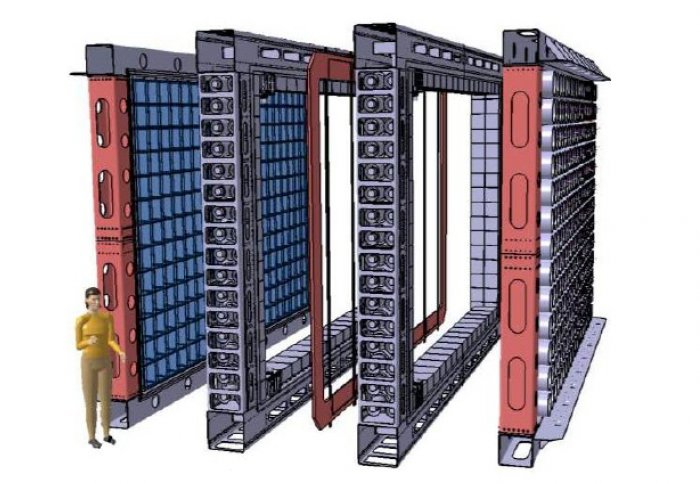UK team probe the nature of the neutrino one mile underneath a mountain

Diagram of the SuperNEMO detector. Credit: supernemo.org
New neutrino experiment ups the ante in the search for antimatter clues.
SuperNEMO – the Super Neutrino Ettore Majorana Observatory has been partly funded, designed and built by a UK team including Imperial researchers, and this month scientists from all over the world gathered at the Modane Underground Laboratory in the south of France to celebrate the official opening.
The experiment is partly funded by over £7million investment from the UK’s Science and Technology Facilities Council (STFC), with collaboration from Imperial College London, Manchester University, University College London (UCL), and Warwick University.
The aim is to use SuperNEMO in the search for neutrino-less double-beta decay, a rare nuclear decay which – if observed – could answer some of the biggest fundamental questions in physics and cosmology.
Neutrinos are fundamental particles which, despite being the most common matter particles in the Universe, are amongst the least understood. If a neutrino-less double-beta decay is observed by SuperNEMO, it would mean the neutrino is different to all the other matter particles in that it would be its own antiparticle.
This discovery would revolutionise our understanding of the relationship between matter and antimatter, potentially giving new insights into how mass is generated, and into the origin of the imbalance of matter and antimatter in the universe, which has long left physicists puzzled.
Imperial joined the SuperNEMO experiment about ten years ago, and personnel have been instrumental in development of the software and simulations for SuperNEMO. For many years, Dr Julia Sedgbeer, from the Department of Physics at Imperial, led the software and simulations group for the collaboration.
She is now concentrating on preparations for data-taking which will start in 2018. She said: “The reconstruction phase is now almost complete and we are looking forward to detector commissioning and the start of data-taking.”
The Modane Underground Laboratory is the deepest in Europe, 1,700m below the peak of the Frejus Mountain. By going deep underground, the SuperNEMO experiment is shielded from the cosmic rays that continually reach the Earth’s surface, making it possible for scientists to spot the incredibly rare double-beta decay events they are interested in.
The UK-built tracking detector shows the paths of electrons given off by the double-beta decays, and this is a feature that other double-beta experiments around the world do not possess. This gives SuperNEMO an advantage, in that it provides certainty that what has been seen is really a double-beta decay, rather than other backgrounds such as alpha, gamma, or single-beta decay.
Furthermore, it enables the scientists to investigate the mechanism behind the decays they see: double-beta decay could be mediated by supersymmetric particles, or other new heavy particles.
UCL’s Professor David Waters, incoming SuperNEMO co-spokesperson, said: “We now face a huge but exciting challenge in extracting the maximum physics impact from our newly built instrument, as well as planning further developments in the field of neutrinoless double-beta decay.”
SuperNEMO builds on the very successful NEMO-3 experiment that ran in the same Modane Underground Laboratory until 2011. Through a very intensive R&D programme this technology has been significantly improved, pushing the boundaries in areas such as detection of traces of radioactive impurities and high-resolution calorimetry. This development has also found its applications outside of SuperNEMO, for instance in dark matter and proton cancer-therapy research.
The construction of the first SuperNEMO module has involved 19 laboratories from seven countries. It has culminated in the Demonstrator module whose launch was celebrated this month. The first physics data will be recorded by the Demonstrator in early 2018.
Article text (excluding photos or graphics) © Imperial College London.
Photos and graphics subject to third party copyright used with permission or © Imperial College London.
Reporter
Hayley Dunning
Communications Division